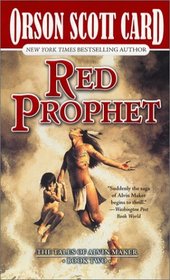An installment in the saga of Alvin Maker, 'Prentice Alvin.
In this book, we learn more about those wild talents, both the minor gifts of the white people--starting fires, finding water, sensing life---and the much grander gifts of the Indians, whose lives are filled with a beautiful green music. With this green music an Indian can run all day and all night without catching his breath, can coax a rabbit out of its hole and ask its permission to be his food, can live in harmony with the earth and all its beings.
Alvin,Lolla-Wossiky, an Indian prophet; and Ta-Kumsaw, a chief, all work together to minimize the evils loosed on the world by White Murderer Harrison, powerful governor of the frontier town of Carthage City.
The second in the Alvin Maker series.
Similar to what Card did in the 'Ender' series, this book starts off covering a lot of the same time period and events as the previous book, but taken from a different character's perspective. It also ventures further into 'alternate history' territory (and boy is it alternate!)
It's about the well-known Native American leader Tecumseh, and his brother Tenskwatawa, who was known as a prophet. (all true).
I have to say that I think the book would have worked better as a pure fantasy story rather than alternate history. As it stands, it doesn't just venture into; it is ALL ABOUT the stereotypes of Native American culture. It's a very allegorical story, but if you want to have a culture be part of an allegory, it works better if it's a made-up culture, not peoples' real lives and history.
For example, an critical point in the story is the famous battle at Tippecanoe. In reality, this was a bloody but equally joined battle between Tecumseh's forces and those of to-be-President Harrison (who, in the book is more-evil-than-evil). In reality, Harrison did win, but there were an about-even number of casualties (less than 100) on each side.
In the book, "Tippy-Canoe" is a massacre: In revenge for the supposed killing of two white boys, white gunmen slaughter NINE THOUSAND Natives who, sworn to peace and non-violence, peacefully line up, unarmed, to be slaughtered.
Now, if Card wants to make a point about martyrdom, that's all well and good, but I have issues with completely rewriting reality like that. And I know I'm not the only one who gets tired of seeing Native Americans portrayed as mystically close to nature, blah, blah, blah.
It takes a bit longer for the real action to get going in the second book of the Alvin Maker series, but trust me when I say that it's worth it to keep going.
From Publishers Weekly
Card's fantasy series, "Tales of Alvin Maker," got off to a delightful bang with Seventh Son, which introduced an alternate early America where folk magics such as healing and dowsing really work. A nation still inchoate, its independent states are a crazy quilt, some rebellious while others remain loyal to a variety of European countries, some repressive while others grant native American Indians citizenship. This second volume finds an exiled Napoleon in Detroit, dreaming of empire and glory while Governor William Henry Harrison is plotting his own future on the graves of red Americans. Between these forces are the native followers of two brothers, the warrior Ta-Kumsaw and the pacifist prophet of the title, Tenskwa-Tawa. ...





